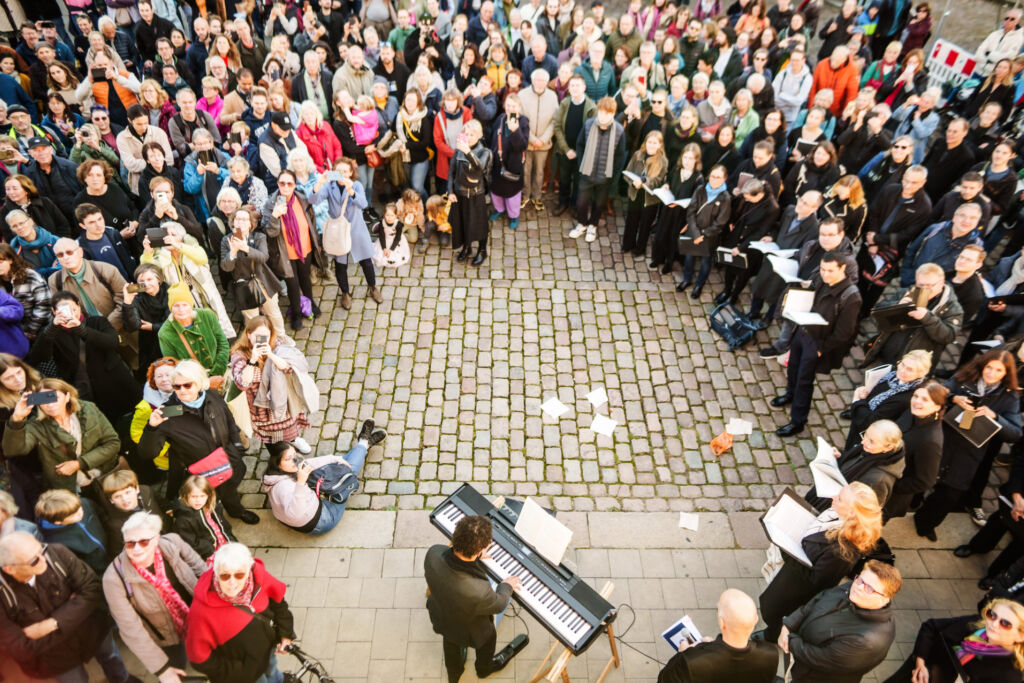We live in a deeply unsettling era overshadowed by an anthropogenic climate catastrophe, violent conflicts, and the erosion of democratic societies. In times like these, everyone is called upon to help build a more sustainable, peaceful, and mutually supportive coexistence, no matter how modest their contributions may be. Universities of music have been among those settings where the aforementioned developments have catalysed an intensive process of contemplation—concerning, in their case, just what role musicians and tertiary-level musical training might assume in response. Accordingly, the field of international music education research has been engaging in broad discussion and developmental work centred on the concept of “artistic citizenship”, with significant inspiration coming from the collected volume Artistic Citizenship. Artistry, Social Responsibility, and Ethical Praxis (2016). In this book, editors David J. Elliott, Marissa Silverman, and Wayne D. Bowman start from an Aristotelian understanding of practice and from pragmatic considerations of a Deweyan nature to argue that the arts should be viewed as a social practice that always features an inherent ethical dimension. In their view, artistic citizens are artists—defined as individuals who engage both professionally and non-professionally in artistic pursuits—who make a conscious effort to bring people together, promote communal well-being, and contribute substantively to a good life in the sense of Aristotle’s Eudaimonia.
It can be assumed that a great many people would be capable of getting behind such an intent: Who, after all, would deliberately refrain from contributing to a good life? But even so, a few important questions still remain unanswered: What exactly is meant by “a good life”? Who decides with what motives just which music shall contribute? What exactly can citizenship be understood to mean in connection with the arts? These questions are of eminent importance, and they need to be critically reflected upon and answered ever anew by musical initiatives and projects with social objectives. After all, history and current events make painfully clear how music can also be used for purposes of manipulation, propaganda, and indoctrination. This is why it can be problematic to uncritically and affirmatively set out on a mission to employ music as a tool for societal transformation (cf. Kertz-Welzel 2025).

Assuming the necessary critical reflection, however, further development of the concept of artistic citizenship does indeed have the potential to become a guiding principle in tertiary-level music education. If citizenship is understood not in the legal sense (i.e., as being a citizen of a country) but in the sense of active solidarity within a collective—not as a state of being, but as a practice, as the political scientist James Tully suggested in his idea of “global citizenship” (2014), and therefore as something that people do together and/or bring forth and interactively negotiate—then it could engender an ability to challenge existing power structures and injustices and to actively shape democratic coexistence. This concept could also, if combined with a broad notion of art, contribute to a better understanding of the relationship between artistic excellence and social engagement. For as Helena Gaunt et al. (2021) quite rightly ascertain, these should embody not two competing priorities but rather values that are inseparably linked with and mutually enrich one another. Musicians are not either artistically excellent or socially engaged, but in fact capable—in an ideal case—of placing both of these qualities in fruitful mutual exchange.
For universities of music, this would entail more than just expanding their concepts of artistic excellence and of musical education and training. It would also require the realisation of concrete initiatives based thereupon that enable students to situate their capabilities in various societal contexts. This might be done as part of new teaching formats, transdisciplinary projects, or cooperative efforts with social and cultural institutions, thereby contributing to a more sustainable, peaceful, and mutually supportive coexistence.
The mdw pursues a diverse array of projects that feature tie-ins to the concept of artistic citizenship. Within the IN.TUNE Universities Alliance, for example, it leads the “Audience Engagement and Artistic Citizenship” working group. The mdw’s Master of Arts in Contemporary Arts Practice (CAP) features the explicit aim of having students “scrutinise societal mechanisms of inclusion and exclusion […] [and] reflect upon their own socio-political responsibility as artists (citizen-artists/artist-citizens)” (Curriculum, p. 5). The subject area “Music in Dialogue” (MiD) at the IMP focuses its teaching and research specifically on questions around musicians’ social responsibility, cultural participation, and community engagement. During the 2025 summer semester, a large number of relevant projects (Grätzl Töne, Library Concerts, Community Orchestra, and many more) will once again take place, with the summer itself then witnessing the first edition of the new “isaCommunity” format. And in the near future, mdwPress is slated to release the collected volume Turning Social. On the Social-Transformative Potential of Music Mediation (edited by Axel Petri-Preis and Annette Ziegenmeyer).
Literature:
Elliott, D. J., Silverman, M. & Bowman, W. D. (eds.) (2016). Artistic Citizenship. Artistry, Social Responsibility, and Ethical Praxis. New York: Oxford University Press.
Gaunt, H., Duffy, C., Coric A., González Delgado, I. R., Messas, L., Pryimenko, O. & Sveidahl, H. (2021). “Musicians as ‘Makers in Society’: A Conceptual Foundation for Contemporary Professional Higher Music Education”. In: Frontiers in Psychology, 12:713648.
Kertz-Welzel, A. (2025). “What we should consider before proposing music education for social change.” In Kai Martin (ed.), Zukunft. Musikpädagogische Perspektiven auf soziale und kulturelle Transformationsprozesse. Weimar: Hochschule für Musik Franz Liszt, p. 36–43.
Petri-Preis, A. & Ziegenmeyer, A. (2025, in preparation). Turning Social. On the Social-Transformative Potential of Music Mediation. Vienna: mdwPress.
Tully, J. (2014). On Global Citizenship. London: Bloomsbury Academic. https://library.oapen.org/bitstream/handle/20.500.12657/30133/9781849665162.pdf?sequence=10&isAllowed=y (accessed on 22 Feb. 2025).
